
Musica Hodie
Scope & Guideline
Exploring the Harmony of Knowledge in Music Studies
Introduction
Aims and Scopes
- Interdisciplinary Music Research:
The journal emphasizes the intersection of music with various disciplines such as education, psychology, sociology, and technology, encouraging comprehensive exploration of how music interacts with other fields. - Music Education and Pedagogy:
A significant focus on innovative teaching methods, assessment strategies, and the integration of music education with other educational frameworks, particularly in formal and informal settings. - Cultural and Historical Perspectives:
Research addressing the cultural significance of music across different societies, including historical analyses that reflect on the evolution of musical practices and the impact of socio-political contexts. - Creative and Experimental Music Practices:
Encouragement of studies in contemporary composition, improvisation, and experimental music, providing a platform for new ideas and creative expressions in music. - Technological Integration in Music:
Exploration of the role of technology in music creation, performance, education, and therapy, reflecting current trends and innovations in the field.
Trending and Emerging
- Music and Technology Integration:
The rise of studies focusing on algorithmic music interfaces, virtual instruments, and digital tools demonstrates a growing interest in how technology reshapes music creation and education. - Inclusivity and Accessibility in Music:
Research addressing accessibility in music, particularly regarding blind conductors and inclusive teaching practices, signifies a trend towards ensuring that music is accessible to diverse populations. - Collaborative and Collective Music Making:
An increase in studies surrounding collaborative musical creation points to a recognition of the importance of community and shared experiences in the music-making process. - Psychological and Emotional Dimensions of Music:
Themes exploring the psychological impacts of music, including emotional development through music education, reflect a growing interest in the mental health benefits of musical engagement. - Cultural Appropriation and Ethical Considerations:
Emerging discussions around cultural appropriation in music highlight the need for ethical considerations in music creation and education, engaging with contemporary social issues.
Declining or Waning
- Traditional Music Theory:
Research centered around classical music theory and historical musicological studies has decreased, suggesting a move towards more contemporary and innovative approaches to music analysis. - Conventional Performance Practices:
There appears to be a waning interest in traditional performance practices, as newer studies lean towards exploring innovative and inclusive methods of music performance and engagement. - Static Music Education Models:
The exploration of static, one-size-fits-all models of music education has diminished, with a growing emphasis on adaptable, student-centered pedagogies instead. - Regional Music Histories:
While still relevant, specific studies focusing solely on regional music histories have become less prominent, possibly as researchers seek to connect these histories to broader global contexts. - Classical Music Reception Studies:
Interest in the reception and critique of classical music has declined, indicating a shift towards more dynamic and interactive forms of music engagement and analysis.
Similar Journals
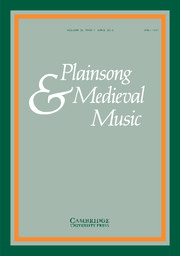
Plainsong & Medieval Music
Illuminating the Cultural Tapestry of Early MusicPlainsong & Medieval Music is a prestigious journal dedicated to the study of early music, particularly plainsong and its cultural contexts, published by Cambridge University Press. Established in 1992, this journal has become a vital resource for scholars in the field of musicology, offering a platform for the dissemination of high-quality research. With an impressive Q1 ranking in the Music category for 2023, it is recognized for its significant contribution to the academic discourse surrounding medieval music traditions. While the journal does not currently offer Open Access options, its rich content, ranging from peer-reviewed articles to critical reviews, remains accessible to researchers, professionals, and students eager to deepen their understanding of this nuanced area. Residing in Cambridge, England, the journal continues to embrace innovative research methodologies, ensuring it remains at the forefront of the evolving landscape of music studies.

Opus
Bridging Theory and Practice in Music ResearchOpus is an esteemed open-access journal published by the Associação Nacional de Pesquisa e Pós-Graduação em Música in Brazil, focusing on the field of music studies. With an ISSN of 1517-7017, Opus has been dedicated to fostering innovative research since its inception and has embraced the open-access model since 2009, ensuring that its findings are readily accessible to scholars and enthusiasts globally. The journal has achieved a commendable Q2 ranking in Music as of 2023, showcasing its impact and relevance within the arts and humanities. Although currently ranked #130 out of 180 in Scopus in the music category, Opus maintains a commitment to enhancing the scholarly discourse in musicology through empirical studies, theoretical analyses, and interdisciplinary approaches. The journal's convergence over the years, from 2017 to 2024, reflects its dedication to evolving educational and research methodologies in music. Situated in the vibrant academic landscape of Campinas, SP, Brazil, Opus invites researchers, professionals, and students to contribute to its mission of exploring the multifaceted dimensions of music.
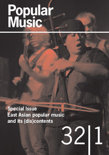
Popular Music
Connecting Music to Global NarrativesPopular Music, published by Cambridge University Press, is a leading academic journal that has been at the forefront of contemporary music studies since its inception in 1981. With its comprehensive scope encompassing a rich diversity of topics within the fields of Cultural Studies and Music, this journal holds a respectable Q2 ranking in both categories as of 2023, underscoring its significant impact on the scholarly discourse surrounding popular music. Researchers, professionals, and students alike will find invaluable insights within its pages as it explores the socio-cultural dynamics of music from various global perspectives. While it is not an open-access journal, the publication aims to foster critical dialogue and interdisciplinary scholarship. Based in the United Kingdom, Popular Music serves as a vital resource for those interested in the intersections of music, culture, and society, sustaining a vibrant academic community through rigorous peer-reviewed articles and reviews. Engage with the latest research and deepen your understanding of popular music's ever-evolving landscape.

Problemy Muzykalnoi Nauki-Music Scholarship
Connecting Scholars Through the Art of MusicWelcome to Problemy Muzykalnoi Nauki-Music Scholarship, a leading journal in the field of music scholarship published by the esteemed Gnesin Russian Academy of Music. With an ISSN of 2782-358X and an E-ISSN of 2782-3598, this Open Access journal has been committed to the dissemination of high-quality research since 2009, making scholarly work accessible to a global audience. Covering diverse aspects of music theory, history, and its socio-cultural impacts, Problemy Muzykalnoi Nauki serves as an essential platform for scholars, educators, and practitioners in the arts and humanities, as well as in social sciences related to music education. While its Scopus coverage was discontinued in 2021, the journal remains influential, holding a rank of #48 in the Arts and Humanities category and a percentile of 67th, showcasing its relevance and rigor in the discipline. We invite researchers and students alike to explore the rich contributions made within these pages, fostering a deeper understanding and appreciation of music in contemporary society.
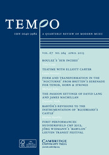
TEMPO
Pioneering Critical Conversations in Music ResearchTEMPO, a renowned journal published by Cambridge University Press, is dedicated to the expansive field of music studies. With its rich history dating back to 1939, the journal has significantly evolved, offering researchers, professionals, and students a platform to explore diverse musical perspectives and innovations. Serving as a vital resource in its category, TEMPO is currently positioned in the Q2 quartile within the field of Music, reflecting its quality and academic influence. Although it operates under a traditional subscription model, its impactful contributions to music scholarship are underscored by its active engagement with contemporary issues in musicology, performance, and education. Researchers can rely on TEMPO for cutting-edge analyses, reviews, and critical discourse that shape the understanding of music in society.

Malaysian Journal of Music
Celebrating the Harmony of Culture and SoundThe Malaysian Journal of Music is a distinguished academic publication dedicated to the exploration and advancement of music and cultural studies within the Southeast Asian context. Published by UNIV PENDIDIKAN SULTAN IDRIS, FACULTY OF MUSIC & PERFORMING ARTS, this journal contributes significantly to the field by disseminating high-quality research and scholarship related to both traditional and contemporary music practices in Malaysia and beyond. Since its inception in 2018, the journal has earned a Q3 categorization in both Cultural Studies and Music, reflecting its commitment to fostering a comprehensive understanding of these interdisciplinary areas. As of now, it ranks 90th out of 180 in the domain of Arts and Humanities focused on Music, positioning it firmly within the academic discourse. The Malaysian Journal of Music serves as an invaluable resource for researchers, professionals, and students alike, providing insights into the rich tapestry of music, culture, and their societal impacts. The journal is dedicated to open access publishing, ensuring that knowledge is shared widely and freely, further solidifying its role as a cornerstone for music scholarship in Malaysia.
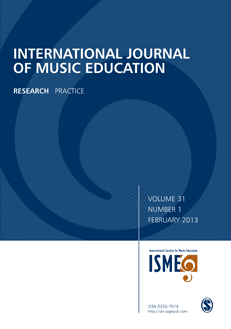
International Journal of Music Education
Elevating music education with cutting-edge scholarship.The International Journal of Music Education is a premier academic platform published by SAGE Publications Ltd, dedicated to exploring the interdisciplinary intersections of music and education. With its ISSN 0255-7614 and E-ISSN 1744-795X, this esteemed journal has been contributing significantly to the field since 1996 and will continue to do so through 2024, underscoring its commitment to advancing scholarly discourse in music pedagogy. It boasts impressive ranking metrics, including Q1 status in Music and Q2 in Education as of 2023, reflecting its influence within these domains. Ranked #10 out of 180 in Music (94th percentile) and #501 out of 1543 in Education (67th percentile) by Scopus, the journal is acknowledged for its rigorous peer-reviewed articles that address contemporary issues, innovative teaching strategies, and the role of music in learning environments. Although it does not offer open access, researchers, professionals, and students are encouraged to engage with its comprehensive research findings, ensuring the advancement of both music education and the broader arts landscape.
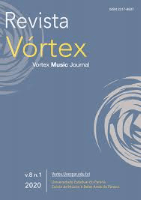
Revista Vortex-Vortex Music Journal
Exploring the Soundscape of Scholarly Music ResearchRevista Vortex-Vortex Music Journal is a premier open-access journal published by the Universidade Estadual do Paraná, specifically through its esteemed Escola de Música & Belas Artes do Paraná. With its ISSN 2317-9937, this journal serves as a critical platform for the dissemination of research and discourse in the field of musicology, music education, and the performing arts. Established in 2014, the journal has been dedicated to fostering scholarly exchange among researchers, practitioners, and students, emphasizing the significance of music as a cultural artifact and academic pursuit. As an open-access publication, it ensures that findings are readily available to a global audience, promoting inclusivity and engagement in the field. Located in Curitiba, Brazil, Revista Vortex invites contributions that explore a diverse range of topics and methodologies, seeking to enhance the understanding of music in contemporary society.
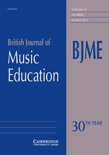
British Journal of Music Education
Elevating Pedagogy Through Innovative ResearchBritish Journal of Music Education is a prestigious academic publication dedicated to advancing the field of music education. Published by Cambridge University Press, it benefits from a notable impact factor that positions it in the Q2 category in Education and the Q1 category in Music as of 2023. This journal serves as a vital platform for researchers, educators, and students alike, focusing on innovative research, pedagogical studies, and theoretical discussions that shape the practice of music education globally. Since its inception in 1984, the journal has contributed significantly to the understanding of music pedagogy and continues to be relevant and influential, currently spanning the years from 1984 to 1998 and 2007 to 2024. With impressive rankings, including rank #16/180 in Arts and Humanities (Music) and rank #669/1543 in Social Sciences (Education) on Scopus, it highlights the journal's commitment to scholarly excellence. Though it does not currently offer open access, its contributions are an essential resource for anyone involved in the education landscape of music.
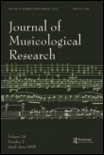
JOURNAL OF MUSICOLOGICAL RESEARCH
Decoding the Language of Music through ResearchJOURNAL OF MUSICOLOGICAL RESEARCH, published by Taylor & Francis Ltd, is an esteemed platform that delves into the field of musicology, contributing to the ongoing dialogue in music research and scholarship since its establishment in 1979. With an ISSN of 0141-1896 and an E-ISSN of 1547-7304, this journal serves as a vital resource for researchers, professionals, and students, offering insights into diverse musicological topics. Although currently categorized in Q4 in Music with Scopus rankings placing it at #110 out of 180 in the Arts and Humanities field, its commitment to excellence and broader discourses in music studies is evident. The journal does not have Open Access options, yet it provides accessible content through reputable academic channels, fostering scholarly exchanges within the community. It aims to publish high-quality research that advances understanding of musical practices and cultural implications, making it a critical resource for those passionate about music and its myriad influences.